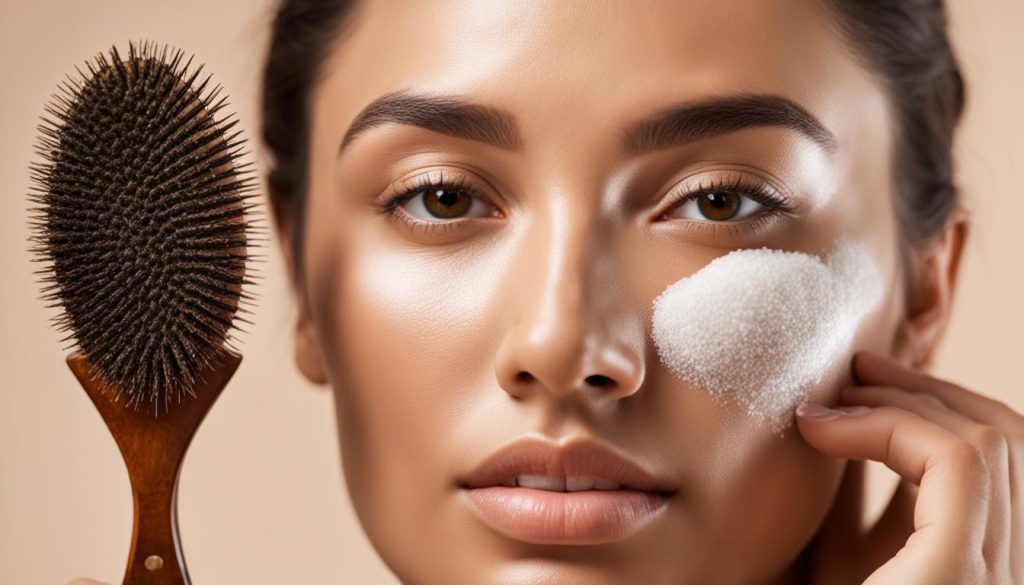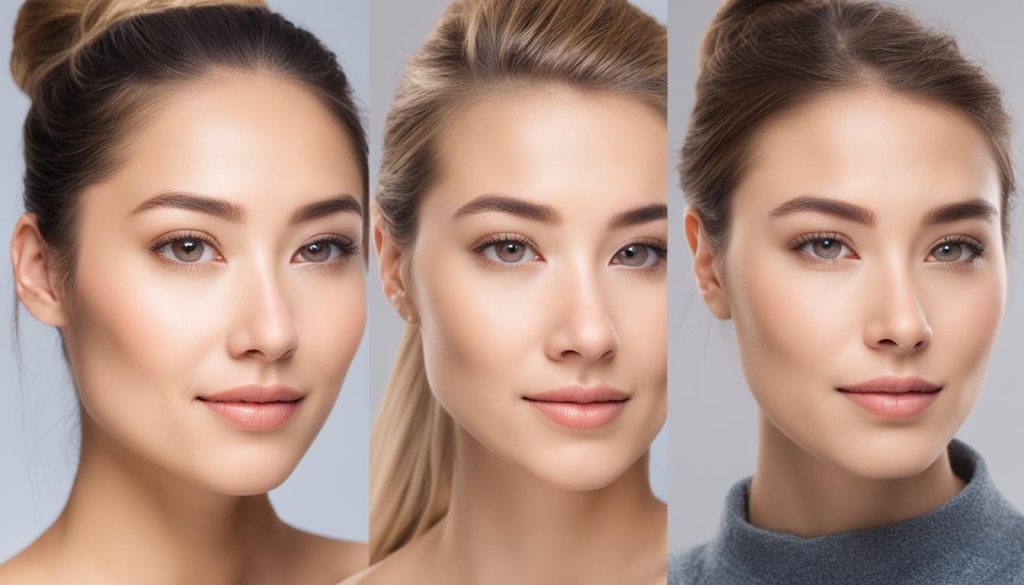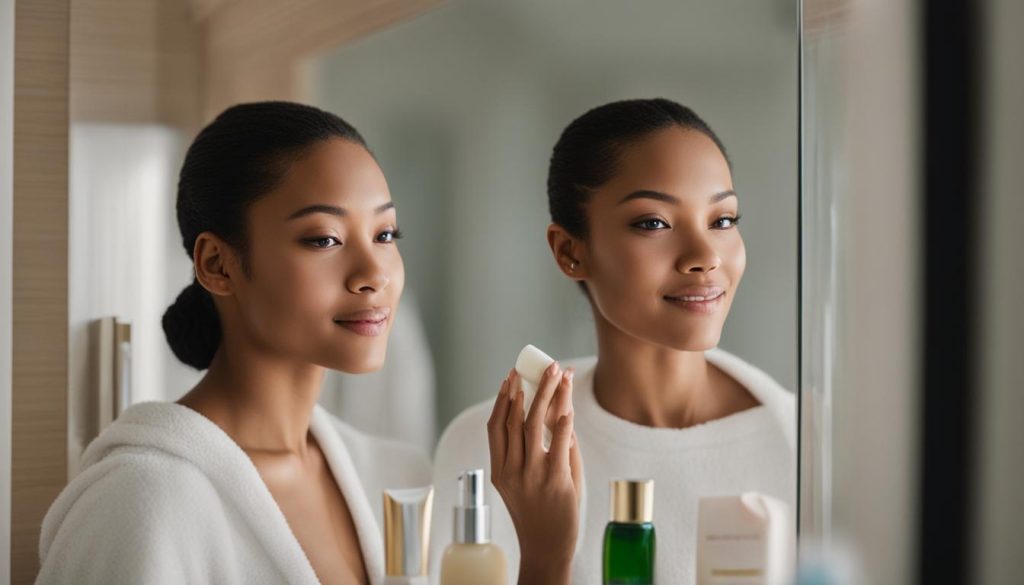The quest for glowing skin is a journey I take seriously. In my endeavors to achieve healthy skin naturally, I’ve learned that beauty truly starts from within. For those eager to discover how to get skin healthy and sustain that coveted radiance, it is essential to establish a mindful and natural skincare routine. Whether seeking clear skin tips or glowing skin tips, the key lies in consistency and choosing a lifestyle that complements your skincare regimen.
Maintaining a healthy diet, staying hydrated, protecting against harsh environmental elements, and being conscious of the skincare products’ impact on our ecology are all pillars to not just illuminating your skin, but also nurturing its health. Join me as we explore the foundational strategies that lead to a vibrant and healthy complexion, all the while cherishing the skin you’re in.
How to Get Skin Healthy
- Nurturing glowing skin begins with a natural, mindful approach to skincare.
- Consistency in a skincare routine and lifestyle choices is vital for achieving a radiant complexion.
- Protecting skin from environmental harm is as important as choosing the right skincare products.
- Proper nutrition and hydration play a crucial role in skin health.
- Healthy skin is a reflection of overall well-being and a balanced lifestyle.
- Celebrate and care for your unique skin type for the best results.
Understanding the Basics of Glowing Skin
Unveiling the fundamentals of radiant skin, I understand it’s a quest to keep my complexion vibrant and “awake.” The pursuit of healthy skin echoes deeper than surface-level attributes—it’s the reflection of a well-nourished and cared-for body. My skin speaks in terms of texture and tone, revealing the delicate balance of hydration and an evenness that shuns the common foes of redness and inflammation. I embrace the authenticity of my being; perfection is an ideal, not a reality.
As I delve into a world where my genetics cozy up to the influential forces of hormonal shifts and environmental elements, I’ve gleaned that effective skincare is grounded in simplicity. Championed by dermatologists, a streamlined regimen centered on cleansing, moisturizing, and sun protection has emerged as the cornerstone for how to keep healthy skin. Indeed, skincare best practices are less of an enigma and more of a dedicated mantra.
My commitment to essential skincare habits dances in a routine that begins and ends with mindfulness. Every splash of water, every application of nutrient-rich creams, and every shielding layer of sunscreen is an ode to the skincare tips that safeguard the vitality of my skin.
- Befriend a gentle cleanser to lift away the day’s canvas.
- Nourish with a moisturizer; my skin’s thirst quenched.
- Arm against the sun’s caress with vigilant protection.
In the interplay of these practices, I find a rhythm that resonates daily—a symphony of deliberate gestures that champion my skin’s health and empower its natural luster.
The Impact of Diet and Hydration on Your Complexion
When I tackle the quest for improving skin health, I consider my plate to be just as crucial as my bathroom shelf stocked with skincare products. A well-curated healthy skin diet forms the foundation of my skincare routine for oily skin. It’s like nurturing a garden; good soil and regular watering lead to blooming flowers, just as wholesome foods and hydration lead to a glowing complexion.
Nourish Your Skin From Within
To me, it’s evident that what I eat transcends beyond mere health—it directly influences my skin’s vitality. Deciphering ingredient lists on skincare products can be daunting, but ensuring my diet is rich in vitamins and antioxidants is straightforward. I focus on embracing a colorful spread of vegetables and fruits, lean proteins, whole grains, and fats that serve my skin’s needs, acting as an internal moisturizer of sorts.
The Importance of Water Intake
Hydration, or the lack thereof, shows on my skin as clearly as a calm or stormy sea reflects the sky. Water is the essence of life, and my commitment to drinking enough water throughout the day is unwavering. I’ve noticed how it supports the resilience and elasticity of my skin, creating a natural barrier against pollutants and stressors that contribute to oily patches and breakouts.
Key Nutrients for a Radiant Skin Diet
Introducing a diverse spread of nutrients into my diet is not just about satiety or energy. These nutrients are the unsung heroes in my skincare routine. Vitamins A, C, and E, Omega-3 fatty acids, and Zinc are meticulous in their work, repairing, renewing, and fortifying my skin. As someone particularly focused on improving skin health, I make it a point to integrate these nutrients regularly.
- Vitamin A for cell growth and skin repair
- Vitamin C for its pivotal role in collagen synthesis
- Vitamin E as an antioxidant that defends against free radical damage
- Omega-3 fatty acids to combat inflammation commonly seen in oily skin
- Zinc to aid in the healing process and foster balance
Finding harmony in my diet is an everlasting journey, but each healthy choice I make is a step closer to complexion perfection. By nourishing my body and maintaining a tailored skincare routine for oily skin, I’m on the path to enduring skin health that radiates from the inside out.

How to Get Skin Healthy with a Daily Skincare Routine
Embarking on a daily skincare routine is essential for those looking to maintain healthy skin and achieve a glowing complexion. Every day, our skin encounters various pollutants and stressors that can damage its appearance and health. By establishing a skincare regimen for healthy skin, we not only cleanse these impurities but also set the stage for a nourishing environment where our skin can thrive. Let me guide you through the critical steps that cater to daily skin needs and share some skincare tips for acne-prone individuals seeking to enhance their routine.
Essential Steps for Daily Care
A holistic daily skincare routine includes several key steps designed to purify, replenish, and shield your skin. Here’s an outline of what your day might look like:
- Morning cleanse to remove oils and prepare the skin for hydration
- Application of a gentle, moisturizing toner to balance the skin’s pH
- Spot treatments for any specific concerns such as acne or dark spots
- Hydration with a light moisturizer suitable for your skin type
- Evening cleanse to remove makeup and accumulated debris
- Nourishing overnight creams or serums to support skin regeneration
By adhering to these steps, your skin can better defend against daily wear and recover more effectively at night.
Choosing the Right Skincare Products
Selecting the appropriate skincare products is critical for tailoring your regimen to meet the unique demands of your skin. As someone dealing with acne, I look for non-comedogenic cleansers that eliminate impurities without stripping the skin of its natural oils. Following cleansing, it’s important to choose a moisturizer that complements your skin type, offering adequate hydration without causing additional breakouts.
- For dry skin, search for products infused with hyaluronic acid and ceramides.
- If you have oily skin, opt for water-based formulations that control excess sebum.
- Those with sensitive skin should gravitate towards fragrance-free and hypoallergenic options.
I can’t stress enough how pivotal it is to focus on ingredients and their synergy with your skin’s needs.
Sun Protection as a Daily Habit
To fully maintain healthy skin, incorporating sun protection into your daily routine is non-negotiable. Whether the skies are cloudy or clear, UV rays can penetrate and cause imperceptible damage that accumulates over time. I always apply a broad-spectrum sunscreen with at least SPF 30 to shield my skin from premature aging and maintain an even skin tone. Wearing sunscreen not only prevents cosmetic concerns but also significantly reduces the risk of skin cancer, one of the most compelling reasons to make it a steadfast habit.
Exfoliation: Revealing Brighter, Smoother Skin
Every time I talk about maintaining a skincare routine for oily skin, I emphasize the transformative power of exfoliation. It’s not merely about sloughing off dead skin cells; it’s an art that enhances your skin’s ability to achieve healthy skin naturally. By incorporating regular exfoliation into your regimen, you open a portal to skincare tips for glowing skin that reflect my years of fine-tuning and personal experience.

Here’s a personal guide I follow that aligns with the luminous ideal of glowing skin:
- Identify Your Skin Type: Whether it’s oily, dry, or a combination, understanding your skin’s needs is the key to choosing the right type of exfoliant.
- Choose Your Weapon: I gravitate towards gentle chemical exfoliants for my oily skin, but I suggest physical exfoliants for those who prefer a tactile scrubbing sensation.
- Be Gentle: Over-exfoliation is a cardinal skin sin. I exfoliate just twice a week to keep my skin balanced without causing irritation.
Exfoliation goes beyond just working on your skin’s surface. I’ve seen firsthand how a properly curated exfoliating process contributes to an overall skincare philosophy that respects and understands the natural workings of the skin.
- Protect After Exfoliating: Freshly exfoliated skin is vulnerable, so a liberal application of SPF is a non-negotiable follow-up step.
- Stay Consistent: Like with any routine, consistency is essential. Exfoliate regularly, but not excessively, to maintain that sought-after glow.
Remember, the way you treat your skin can either unveil its potential or cloak it. I choose to treat mine with care, embracing exfoliation as a step towards uncovering radiant, healthy skin. In doing so, I’ve watched my skin transform, rewarding me with a clearer, smoother canvas that truly glows.
Addressing Skin Concerns with Targeted Treatments
When it comes to achieving and maintaining a skincare regimen for healthy skin, it’s imperative to employ targeted treatments that cater to your unique skin needs. For those of us grappling with specific concerns such as acne, sensitivity, and an uneven skin tone, finding the right products and ingredients is crucial to our skincare best practices. Below, I’ll explore some effective strategies to manage such conditions, aiming for the clearest, most radiant skin possible.
Acne and Blemish Control
My personal battle with acne was a journey, but I found solace in skincare tips for acne that involved using products containing salicylic acid. This incredible ingredient works to exfoliate the skin and unclog pores, leading to fewer breakouts. For those stubborn dark spots left behind by blemishes, niacinamide has been my go-to, helping to fade these areas and promote a more even skin tone.
Treating Dryness and Sensitivity
I understand that managing dry and sensitive skin requires a delicate touch. I’ve discovered that ingredients like glycerin not only hydrate but also draw moisture into the skin. Ceramides, on the other hand, strengthen the skin barrier and protect against irritants. Utilizing products with these components has been a game-changer for maintaining my skin’s hydration and resilience.
Products and Ingredients for Uneven Skin Tone
I’ve seen firsthand how an uneven skin tone can affect self-image. Through consistent use of serums packed with vitamin C and creams containing resorcinol, I’ve effectively improved the luminosity and evenness of my complexion. These ingredients work by inhibiting melanin production, helping to correct dark spots and hyperpigmentation for an overall more balanced and healthy appearance.
Nevertheless, there are times when an over-the-counter solution might not suffice, and that’s when a consultation with a dermatologist can provide more personalized skincare best practices.
The Role of Lifestyle Choices in Skin Health
In my experience as a skincare enthusiast, I’ve seen firsthand how our daily choices significantly shape our skin’s health. While a natural skincare routine serves as a strong foundation, it is the subtle tweaks in our lifestyle that often yield the most profound effects on our skin’s radiance and clarity. Let’s dive into how specific habits can either support or undermine your quest for a glowing complexion.
The Detrimental Effects of Stress and Lack of Sleep
Chronic stress and insufficient sleep have been my foes when pursuing clear skin. Elevated stress levels lead to increased cortisol production which, in turn, can trigger inflammation and breakouts. Moreover, neglecting to obtain adequate restorative sleep can leave the skin looking dull and can worsen conditions like acne or eczema. I’ve found that by incorporating stress-reducing practices and committing to a consistent sleep schedule, my skin appears more luminous, echoing professional healthy skin tips I’ve come across in my career.
Exercise and Skin Elasticity
Committing to regular exercise has not just benefitted my physical fitness but has also played a pivotal role in maintaining the elasticity of my skin. Exercise enhances blood flow, delivering essential nutrients and oxygen to the skin – a key factor in that sought-after glowing skin. The boost in circulation I gain from my workouts seems to lend my skin a natural, healthy flush while supporting its firmness and suppleness against natural aging processes.
Quitting Smoking for Improved Skin Quality
While I’ve never been a smoker, I have observed impressive skin transformations in clients who have kicked the habit. Smoking cessation is an integral step toward better skin health, reducing the risk of premature aging and an uneven skin tone. Not only does quitting support increased collagen production, critical for wound healing, but it also helps in achieving a more even, clear complexion, aligning with expert clear skin tips.
FAQ
What are the best tips for achieving healthy and glowing skin naturally?
To achieve healthy and radiant skin naturally, establish a daily skincare routine that includes gentle cleansing, proper hydration, sun protection, and the use of natural skincare products. It’s also important to maintain a balanced diet, stay hydrated, and get plenty of sleep to support skin health from within.
What makes a skincare routine natural?
A natural skincare routine typically contains products made with ingredients from natural sources, without synthetic chemicals or fragrances. This approach emphasizes plant-derived components, mineral-based options, and organic formulations that are gentle on the skin and environmentally friendly.
How can I keep my skin healthy and glow?
To keep your skin healthy and glowing, practice essential skincare habits such as cleansing, moisturizing, and applying a broad-spectrum sunscreen every day. Additionally, adopt a skincare best practice approach that includes exfoliation to remove dead skin cells and boost your complexion’s radiance.
What are the best skincare tips for a glowing complexion?
Glowing skin can be achieved by staying consistent with a skincare regimen that cleanses, hydrates, and protects. Use gentle, effective products tailored to your skin type, ensure adequate sleep and stress management, and maintain a skin-friendly diet to enhance your skin’s natural glow.
How does diet influence the health of my skin?
Your diet significantly impacts your skin’s health. Consuming foods rich in vitamins A, C, D, E, B-complex, Omega-3 fatty acids, and Zinc can support cell growth and repair, fight inflammation, and protect against oxidative damage. A balanced diet with plenty of fresh fruits and vegetables is essential for maintaining a healthy complexion.
Why is water intake important for skin health?
Hydration is crucial for skin health, as it facilitates the elimination of toxins and aids in maintaining skin elasticity and suppleness. Drinking enough water throughout the day can help maintain the skin’s moisture balance and is associated with a more radiant, glowing complexion.
What nutrients are vital for achieving radiant skin?
Key nutrients for radiant skin include vitamin A for skin repair, B-vitamins for skin barrier function, vitamin C for collagen production and protection from free radicals, vitamin D for skin cell growth, vitamin E for moisture retention, Omega-3 fatty acids for managing inflammation, and Zinc for wound healing and fighting bacteria.
What essential steps should my daily skincare routine include?
An effective daily skincare routine should include cleansing, moisturizing, and applying sunscreen to protect against UV damage. Exfoliation can be added several times a week to remove dead skin cells, and additional steps like toning or using targeted treatments can be beneficial depending on your specific skin concerns.
How do I choose the right skincare products for my skin type?
To choose the right skincare products, identify your skin type—whether it’s dry, oily, combination, or sensitive. Look for products formulated for your specific needs, avoiding harsh ingredients that can cause irritation. Ingredients like hyaluronic acid for dry skin or salicylic acid for oily/acne-prone skin can be especially beneficial.
Why is sun protection a crucial part of a skincare routine?
Sun protection is essential because it guards the skin against harmful UV rays, which can lead to premature aging, skin damage, and an increased risk of skin cancer. Using a broad-spectrum sunscreen with an appropriate SPF should be a daily habit, regardless of the weather or your indoor/outdoor activities.
How does exfoliation contribute to glowing skin?
Exfoliation removes the outermost layer of dead skin cells, revealing the fresher, smoother skin beneath. This process helps to reduce the appearance of dullness, fine lines, and uneven skin texture, resulting in a brighter and more radiant complexion.
What are the best practices for acne and blemish control?
For acne and blemish control, use non-comedogenic skincare products and treatments containing ingredients like salicylic acid, benzoyl peroxide, or niacinamide. Keeping the skin clean, avoiding picking or squeezing blemishes, and consulting with a dermatologist for severe cases are also important strategies.
How should I treat dryness and sensitivity in my skincare routine?
If you have dry or sensitive skin, focus on hydrating and protecting your skin barrier. Use gentle cleansers, and rich moisturizers with ingredients like glycerin, ceramides, and hyaluronic acid. Avoid products with fragrances, alcohol, and other irritants that can exacerbate dryness and sensitivity.
Which products and ingredients should I use for an uneven skin tone?
To address uneven skin tone, look for products that contain brightening ingredients like vitamin C, kojic acid, or azelaic acid. These can help to fade dark spots and discoloration, leading to a more even and luminous complexion. Consistent use and sun protection are key for visible results.
How do stress and sleep affect my skin?
Stress and lack of sleep can cause increased levels of inflammation and hormonal imbalances, both of which can adversely affect your skin’s health. This can manifest as breakouts, dullness, and accelerated aging. Employing stress-reduction techniques and ensuring adequate sleep can help mitigate these effects.
Can exercise improve the health of my skin?
Regular exercise improves blood circulation, which feeds skin cells and promotes collagen production. This not only helps nourish the skin but also may improve skin elasticity and delay signs of aging, contributing to a healthy, youthful complexion.
What are the benefits of quitting smoking for skin quality?
Quitting smoking can have a profound effect on skin quality. It prevents the constriction of blood vessels, which improves blood flow and oxygenation to the skin, accelerates wound healing, reduces the risk of skin cancer, and diminishes signs of premature aging like wrinkles and dullness.






